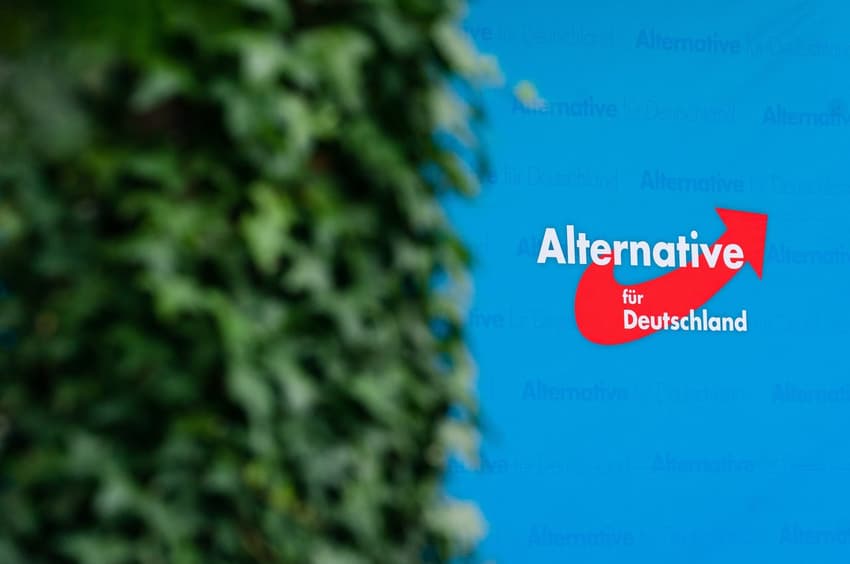Why are the far-right AfD doing so well in German polls?

The Alternative für Deutschland party reached a record high of 22 percent in new voter polls released on Wednesday. Dissatisfaction with the current German government is just part of the reason behind the party's success.
If the federal election were held next Sunday, the latest polls indicate that the far-right AfD would be the second-strongest political force in the country.
The figures, published by research firm Ipsos on Wednesday, indicate that 22 percent of Germans would vote for the party, just behind the Christian Democrats (CDU/CSU) who topped the poll with 26 percent.
Chancellor Olaf Scholz's party, the centre-left SPD, polled below the AfD with 18 percent. The governing party has lost two percentage points since June. The other coalition parties - the Greens and FDP - gained 14 and 7 percent of the poll votes respectively.
The high polling results for the AfD follow a string of recent successes for the party at the local level.
Hannes Loth recently made history by becoming the first-ever mayor from his party in Germany in the town of Raguhn-Jeßnitz in Saxony Anhalt, while the week before, another AfD candidate was elected district administrator in the Sonneberg district of Thuringia.
Both of these election victories were in states in the former east of Germany, where far-right sentiments seem to be more widespread than in the west of the country, according to a recent study by Leipzig University.
READ ALSO: ANALYSIS: Are far-right sentiments growing in eastern Germany?
Why are they doing so well?
According to the study by Leipzig University released last week, one of the reasons for the AfD's popularity in the east of the country is the hangover effect from the fall of the Berlin Wall - which left many pining for the former German Democratic Republic (GDR) and wanting a "strong hand" to lead the country.
Another major factor is the current discontent with the coalition government.
Earlier this week, it was revealed that dissatisfaction with the federal government has reached an unprecedented level, with more than two-thirds of Germans expressing their discontent with the coalition.
According to the survey conducted by the opinion research institute Insa for Bild am Sonntag, 70 percent of the population is currently dissatisfied with the work of the traffic light coalition - the lowest point since the beginning of the legislative period.
Even among supporters of Chancellor Olaf Scholz's SPD party, only half reported being satisfied with the government, while FDP voters were equally as displeased as the general population (70 percent). Green Party supporters on the other hand demonstrated the highest level of satisfaction, with 56 percent expressing contentment with the government's work.
READ ALSO: Germany's beleaguered heating bill hit by embarrassing vote delay
But while the ongoing disputes within the traffic light coalition, particularly surrounding issues like the heating bill have certainly contributed to the declining support in recent surveys, according to Dr. Robert Grimm, Head of Political and Social Research at Ipsos, the reasons for the AfD's ascent in the polls are "multifaceted".
"The country is facing an economic imbalance, and there are no immediate solutions in sight for the concerns of the population - inflation, rising rents, falling real wages, the Ukraine conflict, and migration. Meanwhile, the Union does not offer a programmatic alternative nor does it stand united", he said.
He added that the ongoing troubles in the country's Left Party are also leading to "further migration of votes to the AfD, especially in the East".
Is the AfD an extremist party?
As the record-high polling results for the AfD came out on Wednesday, so did the news that the Brandenburg faction of the party's youth organisation - Junge Alternative (Young Alternative) – has been declared a “right-wing extremist endeavour” by the state's Office for the Protection of the Constitution. Other branches of the party - including the highly radical wing known as Der Flügel - have previously been identified as extremist organisations.

A participant of the AfD rally in Magedeburg wears a T-shirt which reads "Get your country back". Photo: picture alliance/dpa | Heiko Rebsch
A "confirmed extremist endeavour" is the Federal Office for the Protection of the Constitution's highest category for a political organisation; when an endeavour is labelled a confirmed extremist one, the thresholds for wiretapping telephone conversations or the use of informants are much lower than in other cases.
READ ALSO: Why did east Germans vote for far-right AfD in historic election?
Announcing the Court's decision, Jörg Müller, head of the Federal Office for the Protection of the Constitution said that it had "repeatedly identified violations of the liberal democratic order" by the Young Alternative, and that the organisation deliberately violates central principles of human dignity and fuels prejudices and resentments against "foreigners," while diminishing individuals with a migration background as "second-class Germans".
However, the AfD in Brandenburg has come out in fierce defence of its youth faction.
The chairwoman of the Brandenburg AfD, Birgit Bessin, said in a statement: "The Federal Office for the Protection of the Constitution does not protect the constitution; it merely safeguards the government and is increasingly being abused as a tool for left-green power preservation."
She said that the fear of "diminishing power" following the AfD's recent success has triggered "one panic attack after another" in the government.
Comments
See Also
If the federal election were held next Sunday, the latest polls indicate that the far-right AfD would be the second-strongest political force in the country.
The figures, published by research firm Ipsos on Wednesday, indicate that 22 percent of Germans would vote for the party, just behind the Christian Democrats (CDU/CSU) who topped the poll with 26 percent.
Chancellor Olaf Scholz's party, the centre-left SPD, polled below the AfD with 18 percent. The governing party has lost two percentage points since June. The other coalition parties - the Greens and FDP - gained 14 and 7 percent of the poll votes respectively.
The high polling results for the AfD follow a string of recent successes for the party at the local level.
Hannes Loth recently made history by becoming the first-ever mayor from his party in Germany in the town of Raguhn-Jeßnitz in Saxony Anhalt, while the week before, another AfD candidate was elected district administrator in the Sonneberg district of Thuringia.
Both of these election victories were in states in the former east of Germany, where far-right sentiments seem to be more widespread than in the west of the country, according to a recent study by Leipzig University.
READ ALSO: ANALYSIS: Are far-right sentiments growing in eastern Germany?
Why are they doing so well?
According to the study by Leipzig University released last week, one of the reasons for the AfD's popularity in the east of the country is the hangover effect from the fall of the Berlin Wall - which left many pining for the former German Democratic Republic (GDR) and wanting a "strong hand" to lead the country.
Another major factor is the current discontent with the coalition government.
Earlier this week, it was revealed that dissatisfaction with the federal government has reached an unprecedented level, with more than two-thirds of Germans expressing their discontent with the coalition.
According to the survey conducted by the opinion research institute Insa for Bild am Sonntag, 70 percent of the population is currently dissatisfied with the work of the traffic light coalition - the lowest point since the beginning of the legislative period.
Even among supporters of Chancellor Olaf Scholz's SPD party, only half reported being satisfied with the government, while FDP voters were equally as displeased as the general population (70 percent). Green Party supporters on the other hand demonstrated the highest level of satisfaction, with 56 percent expressing contentment with the government's work.
READ ALSO: Germany's beleaguered heating bill hit by embarrassing vote delay
But while the ongoing disputes within the traffic light coalition, particularly surrounding issues like the heating bill have certainly contributed to the declining support in recent surveys, according to Dr. Robert Grimm, Head of Political and Social Research at Ipsos, the reasons for the AfD's ascent in the polls are "multifaceted".
"The country is facing an economic imbalance, and there are no immediate solutions in sight for the concerns of the population - inflation, rising rents, falling real wages, the Ukraine conflict, and migration. Meanwhile, the Union does not offer a programmatic alternative nor does it stand united", he said.
He added that the ongoing troubles in the country's Left Party are also leading to "further migration of votes to the AfD, especially in the East".
Is the AfD an extremist party?
As the record-high polling results for the AfD came out on Wednesday, so did the news that the Brandenburg faction of the party's youth organisation - Junge Alternative (Young Alternative) – has been declared a “right-wing extremist endeavour” by the state's Office for the Protection of the Constitution. Other branches of the party - including the highly radical wing known as Der Flügel - have previously been identified as extremist organisations.

A "confirmed extremist endeavour" is the Federal Office for the Protection of the Constitution's highest category for a political organisation; when an endeavour is labelled a confirmed extremist one, the thresholds for wiretapping telephone conversations or the use of informants are much lower than in other cases.
READ ALSO: Why did east Germans vote for far-right AfD in historic election?
Announcing the Court's decision, Jörg Müller, head of the Federal Office for the Protection of the Constitution said that it had "repeatedly identified violations of the liberal democratic order" by the Young Alternative, and that the organisation deliberately violates central principles of human dignity and fuels prejudices and resentments against "foreigners," while diminishing individuals with a migration background as "second-class Germans".
However, the AfD in Brandenburg has come out in fierce defence of its youth faction.
The chairwoman of the Brandenburg AfD, Birgit Bessin, said in a statement: "The Federal Office for the Protection of the Constitution does not protect the constitution; it merely safeguards the government and is increasingly being abused as a tool for left-green power preservation."
She said that the fear of "diminishing power" following the AfD's recent success has triggered "one panic attack after another" in the government.
Join the conversation in our comments section below. Share your own views and experience and if you have a question or suggestion for our journalists then email us at [email protected].
Please keep comments civil, constructive and on topic – and make sure to read our terms of use before getting involved.
Please log in here to leave a comment.